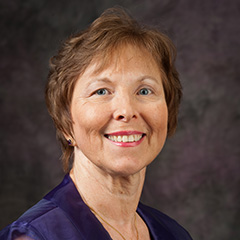December 3, 2019
Graduate School Dean Carol Shanklin to retire at end of academic year
Submitted by Communications and Marketing

After more than 30 years of service to Kansas State University, including the last 10-plus years as dean of the Graduate School, Carol Shanklin will retire at the end of June 2020.
"I would like to thank Carol Shanklin for her outstanding service to graduate education at Kansas State University," said Charles Taber, provost and executive vice president. "When I speak with students it is very clear how much they appreciate Carol's commitment to their success. No higher compliment can be paid to a grad school dean."
Appointed dean of the Graduate School in January 2009 after serving as its interim dean since October 2007, Shanklin coordinates all aspects of graduate education at K-State, including recruitment and retention of graduate students, professional development activities, promoting graduate and professional education, facilitating program quality, and advocating for graduate students. She represents the Graduate School on numerous university committees and task forces. She has mentored more than 100 graduate students and supports K-State's Graduate Student Council as co-adviser. She currently serves on the nomination committee on the Council of Graduate Schools.
"I have enjoyed the opportunity to serve as an advocate for graduate education at K-State and serving as dean of the Graduate School," Shanklin said. "I am pleased with the initiatives that have been implemented with the Graduate School team."
Shanklin joined K-State in 1990 and has taught master's and doctoral courses in food service and hospitality management. She has served the dietetics profession for more than 40 years.
Shanklin's research has focused on food safety and biosecurity in food-service operations, the improvement of food service operations in long-term care retirement communities, on alternative approaches to waste management, and the minimization of solid waste in food service operations. She is a member of the research team for the Center for Food Safety Research in Child Nutrition at K-State, funded by the U.S. Department of Agriculture.
Shanklin has served on the board of directors of the Council of Graduate Schools, as chair of the Midwest Association of Graduate Deans and as president of the Kansas Dietetic Association and, at the national level, has served the American Dietetic Association as chair of the education committee, chair of the Council on Education, chair of the Commission on Dietetic Registration, chair of the research committee, and has represented Kansas as a member of the association's House of Delegates. She has served as chair of the Great Plains IDEA Graduate Deans and cabinet representative, and the Kansas Graduate Deans Council.
She was named one of eight recipients of the American Dietetic Association's 2001 Medallion national award for her research, leadership, advancement of the profession and commitment to dietetic education. Shanklin was selected for the University of Delaware's Michael D. Olsen Research Award in recognition of her research and mentoring of graduate students in 2004. In January 2009 she received the Founder's Award for her leadership and contributions to the creation of knowledge and development. She was selected to receive the 2015 Excellence in Research Practice for Dietetic Research Award by the Academy of Nutrition and Dietetics. Ingram's Kansas Business Magazine named her as one of its 2017 Icons of Education. She was awarded the Flinchbaugh Family Wildcat Pride Award from the K-State Alumni Association in 2018 for her support of outreach efforts worldwide in collaboration with the association.
Shanklin received her bachelor's degree in home economics education from the University of Tennessee at Martin. She received both her master's degree and doctorate from the University of Tennessee, Knoxville, in home economics and food systems administration.
A search for a replacement dean of Graduate School will begin in the near future with additional details forthcoming.
